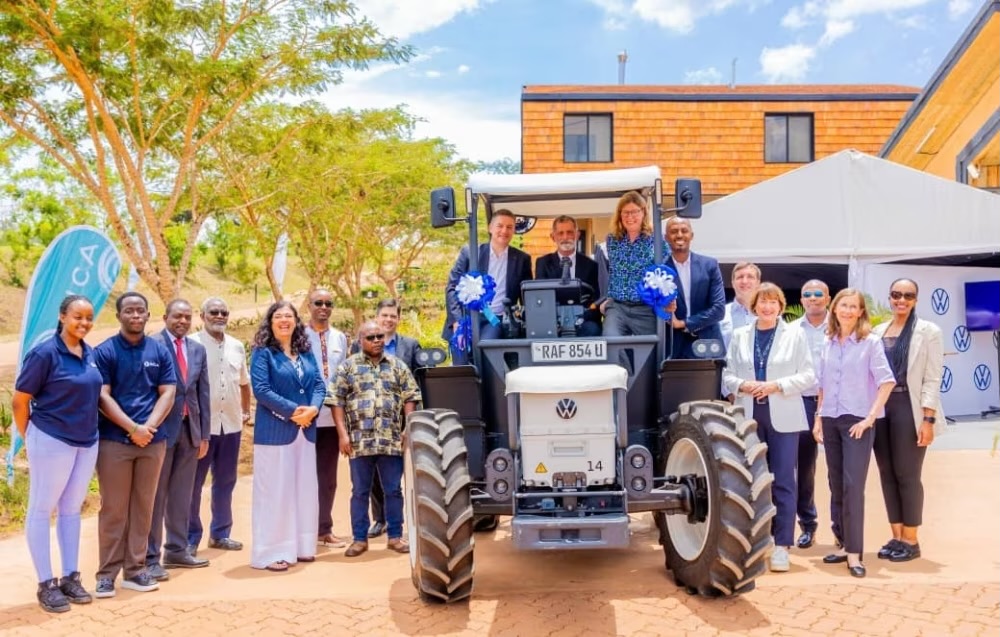Volkswagen Group Africa has officially launched its multifunctional facility in Gashora, Rwanda, to pilot a new era of modern farming using electric tractors. This initiative, named the GenFarm project, introduces a comprehensive ecosystem of e-powered mechanised farming services explicitly designed for rural Africa. The company describes this model as dependable, sustainable, and environmentally friendly, aiming to support farmers with efficient, high-tech farming solutions.
The GenFarm project is being piloted in collaboration with Volkswagen Mobility Solutions Rwanda and Volkswagen Group Innovation Centre Europe, which oversee the development and local implementation of these electric tractors and other e-mobility tools. In addition to farming support, the facility provides transport solutions for goods and people, contributing to a broader ecosystem of mobility services in Rwanda’s rural areas.
Read also: “Technology will shape agricultural financing in Ghana,” says BoG governor Addison
Supporting sustainable growth and rural empowerment
Martina Biene, Chairperson and Managing Director of Volkswagen Group Africa, explained that the project is designed to bring technological innovation to Rwanda and the continent while supporting the group’s commitment to societal and environmental sustainability. “GenFarm aligns with our strategy to create value through sustainable mobility that positively impacts the environment and society,” Biene stated.
The Rwandan government has supported this sustainable farming project by allocating land for the GenFarm facility, providing space for clean energy production, and establishing a base for local farming cooperatives. The project also includes the development of an Empowerment Hub (e-Hub), set to be fully operational by 2025, which will provide storage and operational space for e-tractors and e-scooters. This e-Hub will be a vital resource for farmers, offering easy access to necessary tools and equipment for modern, mechanised farming.
Affordable farming solutions and energy efficiency
Dr Nikolai Ardey, Managing Director of Volkswagen Group Innovation, noted that the GenFarm project allows farmers to access an e-tractor, complete with a trained driver, for an affordable price. “The unique selling point of the project is the use of the battery swap system. In this way, the battery becomes part of the hub’s energy infrastructure as well as energy storage for the tractor,” he explained. This innovation enables efficient power use while reducing downtime, as farmers can easily swap out batteries and continue operations seamlessly.
The Rwanda Institute for Conservation Agriculture (RICA) and the German development agency GIZ support the GenFarm initiative. RICA contributes research and education to train future Rwandan farmers, while GIZ will provide essential machinery and assess the services offered to farmers at the hub.
Read also: Agripredict launches AI-powered weather app for Zambian farmers
Rwanda’s renewable energy push and growing e-mobility sector
According to the World Bank, Rwanda has been proactive in its renewable energy efforts, with renewable sources accounting for 79.9% of the country’s energy consumption in 2022. The Rwandan government has extended a zero-rated import duty on electric and hybrid vehicles until the 2024/25 fiscal year to promote the transition to electric vehicles.
Rwanda’s e-mobility sector is also seeing rapid growth. Local companies such as IZI Electric, which recently received a $222,000 grant from the Rwanda Green Fund, and BasiGo Rwanda, awarded a $225,000 recoverable grant for infrastructure expansion, contribute to the country’s electric transport landscape. Rwanda’s commitment to e-mobility and sustainable energy aligns with its environmental and economic goals as these initiatives progress.
Through projects like GenFarm, Rwanda and its partners are laying the groundwork for a modern, tech-enabled agricultural system, fostering sustainable growth and empowering rural communities nationwide.




